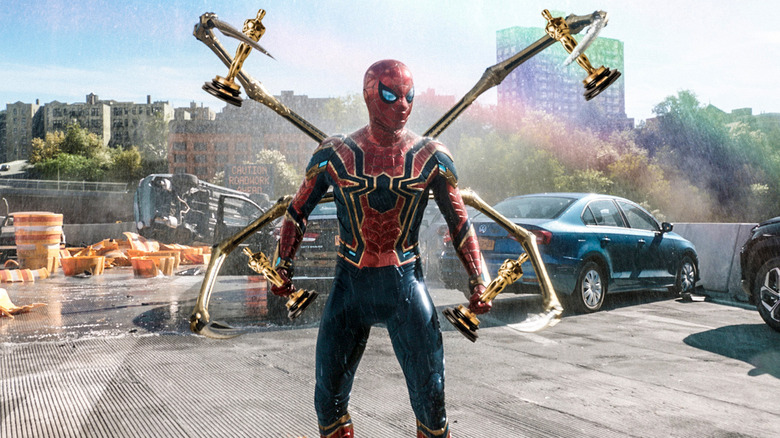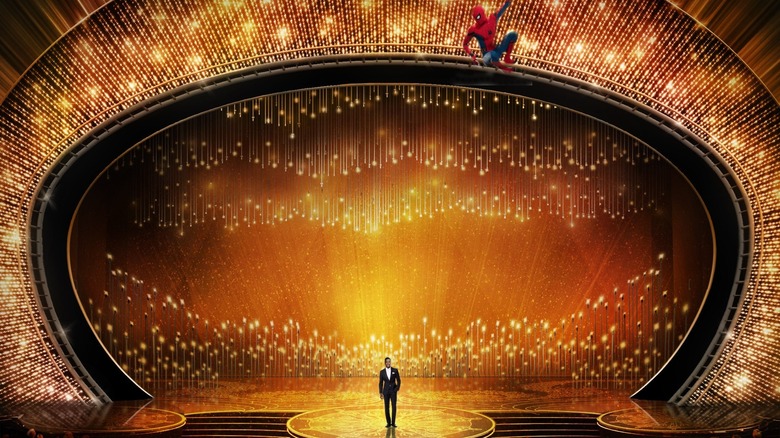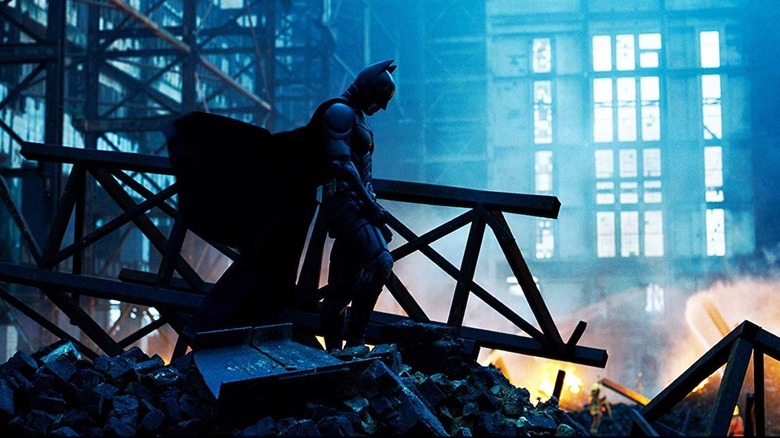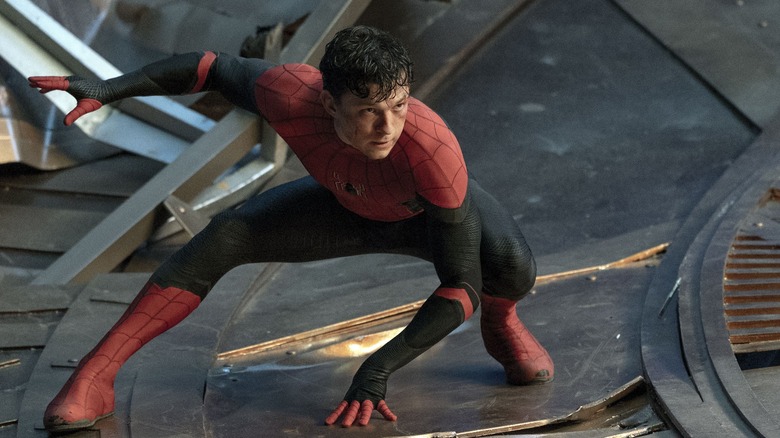What Spider-Man: No Way Home's Oscar Buzz Owes To Superhero Movie Darlings That Came Before
Despite the many challenges of debuting in the midst of a global pandemic, "Spider-Man: No Way Home" has barely slowed down, continuing to shatter box office records and exceed already high expectations. In addition to being Sony's biggest movie to date, the latest Spidey flick has now secured a spot in the top 10 highest-grossing movies of all time, with a whopping $1.36 billion globally. But just because the web-slinger has earned a place in film history — at least when it comes to the question of raw viewership — doesn't mean he can't win a few more accolades elsewhere.
Earlier this week, Sony Pictures and Marvel Studios gave the blockbuster hit a serious awards push, launching a For Your Consideration Oscars campaign. In the process, they've sent the rest of us spiraling back into the unfortunate discussion of Marvel movies as theme parks and what exactly constitutes an "Oscar-worthy" film. Though I hate to stoke the flames of this very annoying fire, this conversation will no doubt intensify in the lead-up to the 2022 Academy Awards ceremony, so we may as well pose the question: can "Spider-Man: No Way Home" actually get recognized at the Oscars?
A Superhero Movie? At MY Awards Ceremony?!
I must've accidentally slipped through the cracks of Doctor Stange's multiverse spell, because something is terribly wrong. There's no way we're seriously discussing a tights-wearing, quip-saying superhero at the Oscars, right? Right?! Nah, just kidding — "Spider-Man: No Way Home" isn't an anomaly for sparking contentious Oscar buzz, and certainly won't be the last to resurrect this discussion. Welcome to a segment I like to call: You Either Die A Hero Or Live Long Enough to See Yourself Lose An Oscar. Because there's simply no world in which we discuss comic book movies and Oscar buzz without first paying our respects to the magnificent work of "The Dark Knight."
Christopher Nolan's zeitgeist-boosted superhero sequel is a Hall of Famer. And as if balancing commercial success, critical acclaim and lasting cultural impact isn't enough, there's also the matter of how "The Dark Knight" altered the Oscars forever. In the leadup to 2008's Academy Awards, the Caped Crusader's return to the big screen was building momentum at breakneck speed, and its chances of a Best Picture nomination were bolstered by a relatively weak pool of competitors. At this point in time, the Best Picture category was limited to five films. As nomination day approached, four of the contenders seemed obvious: "Slumdog Millionaire," "The Curious Case of Benjamin Button," "Milk," and "Frost/Nixon." The fifth slot was in play and "The Dark Knight" seemed like a shoo-in. And then "The Reader" happened.
The Stephen Daldry-directed, Kate Winslet-led drama arrived to lukewarm reviews but had the powerful backing of the now-disgraced Harvey Weinstein, who muscled the film into the conversation. It certainly helped that the Holocaust drama was Oscar-bait friendly whereas the comic book inspired Batman movie was far from the realm of traditional Best Picture winners. In the end, "The Dark Knight" earned a historic eight nominations — and famously took home a posthumous Best Actor trophy for Heath Ledger — but was missing from both the Best Picture and Best Director races. Cue the utter outrage, because this certainly didn't go unnoticed.
He's The Hero The Oscars Deserve
The Academy of Motion Picture Arts and Sciences responded to the outrage within the year by introducing a significant change to the Best Picture race — there would be ten rather than five nominees. In their words (via TV Guide):
"Having 10 Best Picture nominees is going allow Academy voters to recognize and include some of the fantastic movies that often show up in the other Oscar categories, but have been squeezed out of the race for the top prize."
We can all read between the lines here: the expanded pool makes room for critical darlings to share some space with massive crowdpleasers. Yes, indie gems and well-reviewed blockbusters would be forced to mingle (oh the horror) ... at least for two years. By 2011, this switched to a fluctuating number (anywhere from five to ten nominees) and now, in wake of #OscarsSoWhite and similar criticism, the rule has reverted back to ten.
If "No Way Home" has a shot at Oscar glory, it's in large part due to the legacy of "The Dark Knight" — as well as those that benefited from its impact. So far, the only superhero movies to land Best Picture nods have been 2018's "Black Panther" and 2019's "Joker," making the possibility of Spidey's success not entirely out of the question. But then again, neither of those were plain and simple superhero stories. "Black Panther" was a cultural phenomenon and a triumphant exploration of Afro-futurism. And while I can't personally champion "Joker" — the memory of that movie still makes me wince — there's no denying the incredible performance from Joaquin Phoenix nor the film's admirable sources of inspiration. Plus, as far as superhero blockbusters go, these two are relatively divorced from the bogged down connectivity of, say, a certain Spider-Man movie that heavily references 10 years worth of movies.
Put your pitchforks away, this isn't meant to be "No Way Home" slander! But it's worth taking stock of all the factors working against the movie in the Best Picture race. To name a few (and each of these have notable exceptions), generally speaking: genre films don't do well, sequels struggle to shine, and the Oscars tend to favor auteurs (and mega-franchises tend to dull a directors vision). So to alter the question at hand — should "Spider-Man: No Way Home" stand a chance in the Best Picture race? It depends who you ask.
Should Spidey Swing By The Oscar Ceremony?
If the argument in favor of a "No Way Home" nomination is all about its box office success, then we might be wasting our breath. Even before we were in the middle of a worldwide pandemic, big box office returns didn't really correlate to Academy Award winners. The last Best Picture winner to top $100 million at the box office was 2012's "Argo," and the last time the year's highest-grossing film made it into the category was 2009's "Avatar." Turns out money doesn't equal artistry — what an intriguing revelation. But that's besides the point; it's less about the money and more about the people it represents. Sony boss Tom Rothman made this case in a recent THR piece, arguing,
"Quality commerciality is really hard to do. 'No Way Home' is superb filmmaking. And this is what the Academy needs to stay connected to."
Marvel head Kevin Feige added:
"It's a good thing when people are in a theater and they stand up and cheer. It's a good thing when people are wiping tears because they're thinking back on their last 20 years of moviegoing and what it has meant to them. That, to me, is a very good thing — the sort of thing the Academy was founded, back in the day, to recognize."
The bigger issue at hand might be the Academy Awards themselves and what they're meant to recognize — especially because the broadcast's relevance has been in question for a while now. Aside from a couple of yearly spikes, viewership has been steadily decreasing since 2000 and plummeted to an all-time low in 2021. Last year's ceremony drew 9.23 million viewers, a 51% drop from the 18.69 million who tuned in for 2020. This is partially attributed to the lack of viewership for the films in the running; /Film's Ryan Scott went in depth on this in a separate piece that explores the low box office of this years frontrunners:
"Many of the movies that are going to be up for major awards have been seen by a woefully small number of moviegoers, relatively speaking, and that's not good."
So what about the movies people are seeing? Because, based on the numbers, that aggressively refers to "Spider-Man: No Way Home."
Okay, so the uproar over "The Dark Knight" was partially because it's an incredible movie beyond deserving of recognition. And I'm not trying to get ratioed on Twitter so this is no place to start comparing the merits of "No Way Home" vs. "The Dark Knight." It's not even worth discussing if the two are comparable (coughs they aren't) because all that is a matter of personal opinion and unfortunately, I'm not in charge of the Oscars (because if I was then Amy Adams would be crowned the queen of the ceremony and "Titane" would be the only 2021 movie nominated). And anyway, if "Spider-Man: No Way Home" doesn't get nominated, what's the difference? Those box office numbers are still trending towards staggering, the movie will be fine.
But what of the Academy Awards? Shutting out a movie with such a swell of support and excitement around it may be seen as an indicator that the Academy is doing as it's often done — staying the same. And if they aren't growing or changing, then they may not be surviving either.



